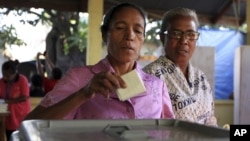East Timorese have voted to choose members of parliament, following a relatively peaceful two-round presidential contest in March and April.
Polls opened early Saturday in an electoral process that is expected to result in the withdrawal of U.N. peacekeepers in December.
Twenty-one parties fielded candidates for the 65-seat parliament. The two top parties are the National Congress for Timorese Reconstruction (CNRT) and the Fretilin.
Damien Kingsbury, an Indonesian expert at Australia's Deakin University, says the campaign period has been surprisingly peaceful, giving a boost to the country's fragile democracy. But he says there remain challenges.
"There's one possible outcome that could be the so-called fly in the ointment," Kingsbury said. "That is, if a coalition is not able to be formed, if there is a minority government which under the constitution is a legitimate option, then I suspect that no one would regard us as legitimate. That would plunge the country back into a fairly nasty internal conflict."
The former Portuguese colony achieved independence in 1975, but was occupied by Indonesia until voters chose independence in an international referendum in 1999. Pro-Indonesian militants began a bloody campaign of retribution, which was ended by the introduction of Australian-led peacekeepers.
In 2002, East Timor was internationally recognized as independent. Despite intermittent violence, East Timor, also known as Timor-Leste, has been relatively peaceful. The last elections were held in 2007.
According to Kingsbury, the international community is optimistic in believing the vote winners will form a coalition government with one political party or another. And if a coalition is formed, the United Nations peacekeepers will leave Timor by the end of the year.
Kingsbury says the involvement of the international community is necessary for various reasons.
"[In] 2006 we came very close to a civil war, and I think had the international community not intervened at that time it would have been plunged into civil war," he added.
Kingsbury says poverty and the distribution of wealth from an $11 billion oil fund from deposits found in the Timor Sea will be among the key issues facing whatever government emerges from the elections.
He says the funds must be distributed fairly among residents of one of the poorest Asian countries. He says the capital, Dili, has shown infrastructure improvements in the 10 years since independence, with traffic jams and a new shopping mall. But, he says outside the city, little has changed.
Polls opened early Saturday in an electoral process that is expected to result in the withdrawal of U.N. peacekeepers in December.
Twenty-one parties fielded candidates for the 65-seat parliament. The two top parties are the National Congress for Timorese Reconstruction (CNRT) and the Fretilin.
Damien Kingsbury, an Indonesian expert at Australia's Deakin University, says the campaign period has been surprisingly peaceful, giving a boost to the country's fragile democracy. But he says there remain challenges.
"There's one possible outcome that could be the so-called fly in the ointment," Kingsbury said. "That is, if a coalition is not able to be formed, if there is a minority government which under the constitution is a legitimate option, then I suspect that no one would regard us as legitimate. That would plunge the country back into a fairly nasty internal conflict."
The former Portuguese colony achieved independence in 1975, but was occupied by Indonesia until voters chose independence in an international referendum in 1999. Pro-Indonesian militants began a bloody campaign of retribution, which was ended by the introduction of Australian-led peacekeepers.
In 2002, East Timor was internationally recognized as independent. Despite intermittent violence, East Timor, also known as Timor-Leste, has been relatively peaceful. The last elections were held in 2007.
According to Kingsbury, the international community is optimistic in believing the vote winners will form a coalition government with one political party or another. And if a coalition is formed, the United Nations peacekeepers will leave Timor by the end of the year.
Kingsbury says the involvement of the international community is necessary for various reasons.
"[In] 2006 we came very close to a civil war, and I think had the international community not intervened at that time it would have been plunged into civil war," he added.
Kingsbury says poverty and the distribution of wealth from an $11 billion oil fund from deposits found in the Timor Sea will be among the key issues facing whatever government emerges from the elections.
He says the funds must be distributed fairly among residents of one of the poorest Asian countries. He says the capital, Dili, has shown infrastructure improvements in the 10 years since independence, with traffic jams and a new shopping mall. But, he says outside the city, little has changed.






